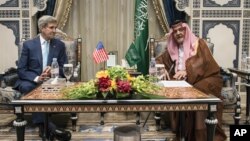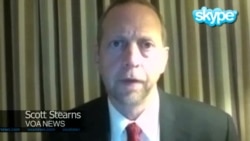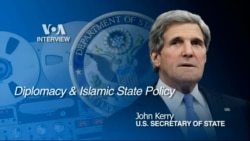U.S. Secretary of State John Kerry and the U.S. administration are disappointed by Russia’s initial reaction to President Barack Obama’s speech on the Islamic State militant group Wednesday.
In an interview Thursday evening with VOA in Saudi Arabia, Kerry said, "I would hope that Russia will come to see that ISIL really represents a threat to them, too.
"There are problems through many of the countries around Russia and near Russia and even in some of the parts of Russia," he said, referring to its experience with Chechnya. "There are terrorists, many of whom will take an example from ISIL and what is happening [in Syria and Iraq]."
Syria and Russia are both denouncing Obama's threat to attack Islamic State fighters in Syria. Russian Foreign Ministry spokesman Alexander Lukashevich said such action without the consent of the Syrian government or the U.N. Security Council "would be an act of aggression, a gross violation of international law."
Kerry said Russia should not block the coalition, however, but should join the international effort against IS militants.
Kerry said the Obama administration hopes Russian President Vladimir Putin's government will help the international community "engage in responsible behavior to deal with" ISIL and end the war in Syria.
"I think over time, Russia will see that the real need is for them to be more cooperative and stop supporting a guy like [Syrian President Bashar al-Assad], who kills his own population, and to help bring about a political solution," he said.
"We are looking to Russia to help bring about a political solution," said Kerry. "We still believe that's the only solution for what is happening in Syria."
VOA's Scott Stearns discusses the Kerry interview:
Possible Iranian role
Iran is allied with Russia in backing Syria's Assad, but it shares U.S. concerns about the Islamic State, helping arm Kurdish forces in Iraq that are backed by U.S. airstrikes.
While Kerry said there is no direct military cooperation with Iran, he told VOA that Tehran and Washington do not want to get in each other's way as they fight a common enemy.
"Both Iran and the United States are smart enough to take precautions to make sure that there is a deconfliction with respect to that kind of possibility," he said.
"That's common sense, but it doesn't amount to cooperation in terms of military operations or otherwise," Kerry added. "And certainly we will keep people out of harms way as appropriately, and we would hope they would."
A senior State Department official said the United States and its Arab allies in this coalition are "pretty much aware of what Iran is doing in Iraq. And they're not trying to conceal it either."
France hosts a conference on the Islamic State next week that will include the other four permanent members of the U.N. Security Council -- Britain, China, Russia, and the United States.
French officials have said previously that Iran should also take part in those talks. But Iran believes tackling the Islamic State in Iraq and Syria should include representatives from the Syrian government, which is opposed by the United States, Britain, and France.
The U.S. secretary of state, following up on Obama's push to "degrade and destroy" the group in both Iraq and Syria, secured a committment Thursday from 10 Gulf and Arab leaders to form an international coalition against Islamic State militants at a meeting in Jeddah, Saudi Arabia.
The top U.S. diplomat continues his regional tour to forge a broad alliance against the Sunni militant group Friday in Turkey. From there he will travel to Egypt, meeting top leaders in Cairo.
Audio of full Stearns' interview with John Kerry







